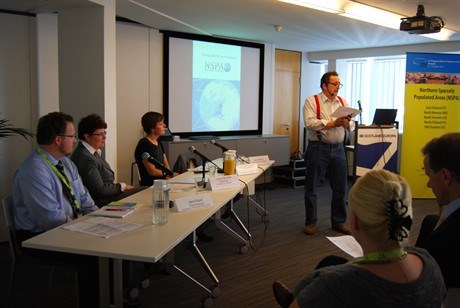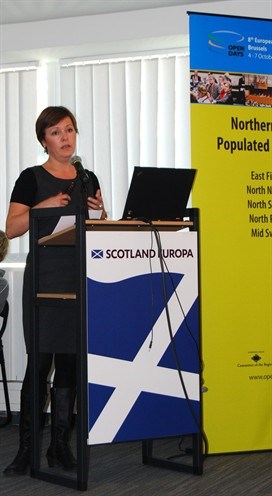OPEN DAYS 2010: Workshop report
Read more about the workshop Northern Sparsely Populated Areas – Strong Specific and Promising on 5th October in Brussels.
The workshop was opened by Pia Svensgaard who introduced the NSPA network and gave a short description of the regions' characteristics and geographic conditions. The regions of northern Finland, Norway and Sweden have many common circumstances such as sparse population, harsh climate and long distances. This part of Europe is also specifically affected by globalisation, energy-supply, climate change and demographic change. The region is rich on natural resources but has a population density of only 4.9 inhabitants per km2, something that cannot be found in any other part of the European Union.
The NSPA network consists of 14 regions in three countries sharing common circumstances and objectives, working together to raise awareness of the region in the EU institutions, influence EU policy and to provide a platform for best practise.
Pia Svensgaard underlined the region's dependence on a holistic and qualitative approach on regional policy and welcomed a fruitful debate on the needs of NSPA business when it comes to EU policies.
Debate
Toini Løvseth, Policy Manager with Finnfjord AS, introduced the participants to the privately owned company Finnfjord AS in northern Norway that produces ferrocilicon, an alloying element essential in steel production. Finnfjord produces ferrosilicon in an effective and sustainable manner with renewable energies, aiming to be the world's most energy efficient ferrosilicon producer, by taking control of the cost of electricity. Toini Løvseth hence requested visibility of energy efficiency in EU policies as a way of combating climate change. Download Ms Løvseth's presentation here.
Laura Sinisalo, Chairwoman with Nutrinet Oy, emphasized the advantages of conducting business in the field of nutritional therapy in the northern sparsely populated areas. In addition to a high level of education and know-how in medicine, nutrition and food and a trained workforce with good language skills there is a great potential of developing healthcare tourism and healthcare export through ICT. The challenges, on the other hand, lie in financing new areas of business. Download Ms Sinisalo's presentation here.
Jens Kyed, Project Manager with the Confederation of Norwegian Enterprises (NHO) explained the importance of knowledge of the EEA agreement and the EU policies for north Norwegian businesses, since the EU is Norways largest trading partner. The project Nordland Europe Office for enterprise aims to make more enterprises involved in EU funded projects and to higher the level of knowledge about the EEA agreement and the applied rules, hence giving enterprises in the region the possibility to take full advantage of the rights and possibilities provided by the EEA agreement. Download Mr Kyed's presentation here.
Conclusions

Jens Nilsson concluded the seminar by summing up the discussions as follows:
- The seminar provided real cases of successful business in the NSPA, showcasing both advantages and challenges, defining what kind of EU policies the enterprises in the region need.
- There is a reason to see to the energy need for enterprises, making energy efficiency visible in energy policies.
- The regulations on state aid make it difficult for companies with the will to set high goals to meet climate policies.

- Energy efficiency is the most efficient way to save the climate, however this is not visible in EU policies, Toini Løvseth, Policy Manager with Finnfjord AS commented.
More information:
Finnfjord AS www.finnfjord.no
Nutrinet Oy www.nutrinet.fi
Confederation of Norwegian Enterprises www.nho.no/nordland
